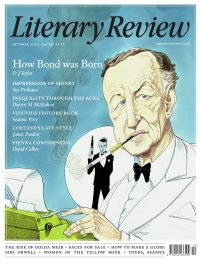Richard Vinen
Foes in High Places
Mirrors of Greatness: Churchill and the Leaders Who Shaped Him
By David Reynolds
William Collins 464pp £25
Like many gregarious men, Winston Churchill had few friends. After Lord Birkenhead (F E Smith) drank himself to death in 1930, he probably had none. There were, of course, admirers. The most important of these was Churchill’s one-time private secretary John Colville, who celebrated the prime minister’s achievements, covered up his failures and curated his memory. There were also those whom Churchill admired. These were, though, rarely of his own age. His collection of essays Great Contemporaries is, at least so far as its British subjects are concerned, about men a generation older than Churchill. Churchill had got to know Lord Curzon, Lord Rosebery and Joseph Chamberlain partly because he had entered politics so young but also because he had sought them out when he was writing his biography of his father, Lord Randolph Churchill. Celebrating such men in the 1930s was, of course, partly a means of celebrating the pre-1914 world, for which Churchill sometimes expressed nostalgia; it was also a means of suggesting that Churchill himself was the last survivor of a race of political giants, casting his shadow over the pygmies of his own time.
Things were more complicated when it came to foreign leaders. From 1929 onwards, Churchill’s gaze was primarily focused on questions of empire, war and diplomacy. This in turn meant that many of those who mattered to him were foreigners. He wrote about some of them with understanding and sympathy, and his verdicts were often unexpected. He hoped, at first, that Hitler might turn away from war and confine himself to the revivification of Germany. A year or so later, he wrote in more hard-headed terms about Stalin. Years before the Anglo-Soviet alliance of 1941, he recognised that the monstrous internal repression within the Soviet Union did not necessarily pose a threat to the interests of the Western democracies and that Stalin (in contrast to Trotsky, whom Churchill always despised) was just a very nasty incarnation of Russian nationalism. He admired Roosevelt, though it is interesting to note that the New Deal could seem dangerously radical to a British Conservative and that Churchill disliked what he believed to be the persecution of the rich in the United States.
The two most notorious relationships of Churchill’s life were probably those with Gandhi and Charles de Gaulle. He fantasised about having the first trampled under an elephant ridden by the viceroy and joked about the second, ‘he thinks he’s Joan of Arc, but I can’t get my bloody bishops

Sign Up to our newsletter
Receive free articles, highlights from the archive, news, details of prizes, and much more.@Lit_Review
Follow Literary Review on Twitter
Twitter Feed
It wasn’t until 1825 that Pepys’s diary became available for the first time. How it was eventually decrypted and published is a story of subterfuge and duplicity.
Kate Loveman tells the tale.
Kate Loveman - Publishing Pepys
Kate Loveman: Publishing Pepys
literaryreview.co.uk
Arthur Christopher Benson was a pillar of the Edwardian establishment. He was supremely well connected. As his newly published diaries reveal, he was also riotously indiscreet.
Piers Brendon compares Benson’s journals to others from the 20th century.
Piers Brendon - Land of Dopes & Tories
Piers Brendon: Land of Dopes & Tories - The Benson Diaries: Selections from the Diary of Arthur Christopher Benson by Eamon Duffy & Ronald Hyam (edd)
literaryreview.co.uk
Of the siblings Gwen and Augustus John, it is Augustus who has commanded most attention from collectors and connoisseurs.
Was he really the finer artist, asks Tanya Harrod, or is it time Gwen emerged from her brother’s shadow?
Tanya Harrod - Cut from the Same Canvas
Tanya Harrod: Cut from the Same Canvas - Artists, Siblings, Visionaries: The Lives and Loves of Gwen and Augustus John by Judith Mackrell
literaryreview.co.uk